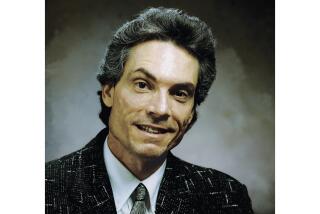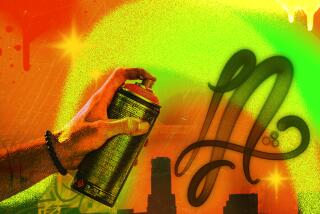POP MUSIC : Public Enemyâs Chuck D: Puttinâ on the Rap
NEW YORK â Chuck D, the chief wordsmith and propagandist for the outspoken rap group Public Enemy, spent much of 1987 defending himself against some charges that his songs reinforce the violent image that is often associated with rap music.
âYeah, there was a problem with some of the language on the album, but most of it was just a misunderstanding of what the songs were about,â acknowledged D, in the decidedly un-plush headquarters of his management company, Rush Productions.
Among the concerns raised last year: a reference to Uzi machine guns by a group that stresses black power and black pride.
âIâm not urging anyone go pick up a gun,â explained D, who was wearing a Los Angeles Raiders jacket as he sat in a chair near posters of fellow Rush acts Run-D.M.C. and the Beastie Boys.
âI used Uzis as a metaphor for the brain . . . to point out how words can be more powerful than bullets. You have to use strong images at first to grab peopleâs attention. If I had just said, âMy brain is powerful,â no one would have thought twice about it. I say Uzis and they pay attention, but you could tell what the song was about if you paid attention. Some people just heard that one word and said, âOh, itâs about mindless violence.â â
The rapper also insisted that other charges frequently leveled at him--that âSophisticated Bitchâ is misogynist and that âYouâre Gonna Get Yoursâ is an inflammatory attack on police--are based on misinterpretations of the songs and his position.
So one might assume that Chuck D also has a clarification ready for the attack on black radio programmers and, more important, for the apparent endorsement of controversial Black Muslim minister Louis Farrakhan that appears on a new Public Enemy track, âBring on the Noise.â The track, which appears on the âLess Than Zeroâ sound-track album, has been released as a single by Def Jam Records, which is distributed by Columbia.
But this time, Chuck D says no defense is in order. The song is a challenge to black radio programmers who, he says, avoid playing Public Enemyâs music because itâs âtoo black or too political.â And the Farrakhan line--âFarrakhanâs a prophet that I think you oughta listen toâ--is not a metaphor for anything.
The rapperâs slap at radio isnât unusual. Progressive or controversial record-makers are always attacking conservative radio programmers. But the Farrakhan remarks are not going to be as easily dismissed--not that Chuck D wants them to be.
Farrakhan, the leader of the Nation of Islam, has been widely criticized for statements interpreted by some as being racist and anti-Semitic. Los Angeles Mayor Tom Bradley asked City Atty. James K. Hahn last year to determine if the city could legally block a Farrakhan speaking engagement at the Los Angeles Convention Center.
Hahn advised Bradley such action would probably be illegal, and Farrakhan addressed more than 8,000 people, urging blacks to work together to âseize economic power.â
Observed Chuck D, âFarrakhan scares people, at least white people. But a lot of people who attack him have never even heard the man. They just take quotes that the media throws out at them. Farrakhan is a man I believe in and a lot of black people believe in because he lays everything out logically.â
If some of Chuck Dâs views invite debate, Public Enemyâs music has been widely supported by critics--especially in England, where the prestigious New Musical Express named the groupâs debut album, âYo! Bum Rush the Show,â the best LP of 1987.
Still, the album has only sold about 300,000 copies--healthy for a debut LP, but far short of the multi-platinum debuts by Rush Management stablemates the Beastie Boys and L.L. Cool J.
âItâs frustrating,â Chuck D complained, but he has no intention of listening to those who have whispered that heâd get more airplay and sales if he toned his messages down a little.
âIf we toned down, it would take the satisfaction and fun out of making music,â he said sharply. âIf you toned down, you would end up with the basic state of R&B; today, which is basically nothing. I loved Motown in the â60s and early â70s . . . the song structure and content of the songs. But nothing new is happening in R&B; today.
âA lot of people accuse rap of talking about the same thing over and over, but rap is far more broad than R&B; is right now. Every R&B; song is about love. Rap talks about everything. . . . Iâm interested in politics and social commentary.â
Like Run-D.M.C. and most other rap stars, Chuck D (his real name is Carlton Ridenhour) came from a lower-middle to middle-class background in the New York suburbs. His interest in politics was sparked, he believes, by his mother, who was an activist in the â60s. His parents sent him during summers to a study program where some of the teachers were former Black Panther Party members, he said. The emphasis was an intense examination of black culture.
Chuck D, who speaks in the serious, straightforward but overbearing way of an earnest college tutor, feels most public schools shy away from the gritty reality of black history in America, leaving blacks on the lower end of the economic scale unable to understand the true difficulty involved in ever improving their condition.
âYou have people saying, âBut the problems of the past are over, letâs not even think about it,â â Chuck D suggested. âBut the problems growing out of hundreds of years of (slavery) remain for millions of black people and the only way I see them (overcoming the problems) is through education and networking. . . . Working together, creating businesses among themselves . . . using the American mechanism. Thatâs what the Japanese have done, and they have caught Americans sleeping. Blacks need to work together, too. . . . They canât wait for the system to take care of them.â
While advocating black economic cooperation, Chuck D says he isnât advocating racial separation in America. âMy ideal America is where everybody accepts each other on equal terms, but that is a fantasy until we restructure a system that has been designed to take advantage of people.â
Chuck D refuses to give his age, but appears to be in his early 30s, which makes him years older than most of his rap cohorts. He grew up in Hempstead, Long Island, in the â60s, listening to Motown and loving sports. He cites Stevie Wonderâs âFingertipsâ as an early favorite, but he didnât think seriously about being a musician until the rap movement started in the late â70s.
âI was fascinated with deejaying, seeing someone stand with two turntables and make the records do all kinds of new and exciting things,â he recalled. âThe great thing was the way the deejay would take a record you liked and concentrate on just the part you loved the best--going over it again and again in a way that made what he was doing better than the original record. Then, the guys would start talking over it. . . . That was for me.â
Chuck Dâs eyes sparkle when he begins listing some of his favorite early rap records--from Grandmaster Flashâs âThe Messageâ to Run-D.M.C.âs âSucker MCs.â His own music incorporates some of the dynamics of those records with the radical, socially conscious tradition of groups like the Last Poets. The other members of Public Enemy are Flavor Flav, Professor Griff and Terminator.
Despite generally strong reviews for the debut album in the rock press (Rolling Stone magazine lauded âYo! . . . â as âdeffest jams of â87â and warned that with âno-nonsense competition like this, Run-D.M.C. could be illinâ, not chillinâ . . . â), Public Enemy has made few inroads into the rock market, even the college/alternative radio world that generally champions bands with a radical edge.
Itâs clearly a market Chuck D would like to tap.
âIn some ways, I see rap as closer to rock these days than to soul,â he said. âRap and rock both grew out of black music and they have the same aggressive, questioning attitude. We found in doing shows with the Beastie Boys and shows before almost all white audiences in Europe that white audiences pick up on lyrics faster than black audiences.
âWith a black crowd, they will only pay attention to the words if you prove to them that you are what is happening. When I first started out, I was happening kinda slow, but now I am at a level where I am in the top block and what I say is now important. Thatâs why the message on the next album (due in late March) is going to be even stronger, deeper issues.â
The music for the album is already finished, Chuck D said. The title: âIt Takes a Nation of Millions to Hold Us Back.â
More to Read
The biggest entertainment stories
Get our big stories about Hollywood, film, television, music, arts, culture and more right in your inbox as soon as they publish.
You may occasionally receive promotional content from the Los Angeles Times.










